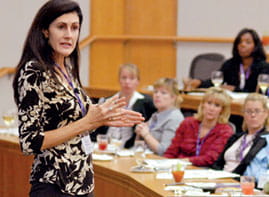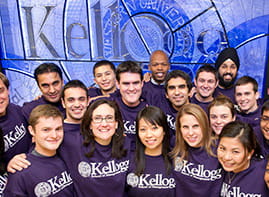1/21/2008 - The convergence of the human genome project, cracks in the traditional firewall between pharmaceutical and diagnostic companies, the widespread use of electronic medical records, and rare agreement among government, industry, advocates and regulators should speed up the evolution of personalized medicine in the years ahead, said panelists at the Kellogg School’s Business of Healthcare Conference, held Jan. 19 at the Donald P. Jacobs Center.
| |
 |
Related Video |
|
| |
| |
|
| The annual student-run event marked its eighth year and considered the hurdles, ethics and potential advantages of personalized medical treatment.
In the last decade, companies have deployed a collective 200,000 scientists and spent $27 billion in developing potential solutions with “few winners,” said keynote speaker William Kozy, executive vice president of Becton, Dickinson and Company, a $6.4 billion medical technology and device manufacturer. But with patients becoming more educated about their healthcare, and an estimated 2 million adverse drug reactions nationwide costing healthcare organizations billions, the incentives are falling into place, he said.
Personalized diagnostics are nothing brand new, Kozy said, but “momentum is building around this interest in the patient.” The agreement about the need among different sectors is “one of our reasons for optimism and enthusiasm.” Patient advocates are ramping up efforts, the U.S. Food and Drug Administration is watching the issue closely, and Sen. Barack Obama (D-Ill.) has introduced the Genomics and Personalized Medicine Act” to boost federal support, he said.
Pharmaceutical companies historically have avoided diagnostic products due to the “marketing costs and complexity,” Kozy said, but some companies have moved into both spheres, and this could “lead to smaller, quicker clinical trial solutions.” To do this, the FDA’s typically “large, detailed, expensive trials” will need to be put on a faster track. Pay-for-performance to physicians who successfully use such tools also will be important, a key concept in Obama’s legislation, he said.
“Yes, it’s complex. Yes, it’s doable,” said Kozy, one of two keynotes at the daylong event (Michael Conway, principal in McKinsey & Co.’s pharmaceutical and medical products practice, spoke earlier to open the conference). “This industry should not compromise here.” He added that this would require a “culture of passion” among those committed to targeted therapeutic approaches that will solve the problem of adverse drug reactions.
Personalized medicine also will require “a huge amount of data to be put somewhere,” said Jonathan Schaffer ’01, a physician and managing director at the eCleveland Clinic, who participated in “Personalization as a Competitive Strategy,” one of six panel discussions at the conference. Schaffer’s online adjunct to the Cleveland Clinic does this through an electronic medical record system that serves 5.1 million patients by managing their care, recognizing patterns, and educating them.
The eClinic’s “MyChart” function, for example, gives patients the ability to see their own records, request appointments, and communicate with physicians, said Schaffer during the panel, which was moderated by Kellogg graduate Bill Woodson ’93, vice president of SG-2, a healthcare research and consulting firm. “They may not get a response at 2 in the morning, but at least it’s off their shoulders,” Schaffer said.
The MyConsult process provides the ability to ask questions and obtain a second opinion online, Schaffer explained, recalling an anecdote that drove home patients’ desire to more easily communicate. When he told an elderly woman to call anytime with questions, “without missing a beat, she said, ‘What’s the matter, sonny? Don’t you have e-mail?’”
United HealthCare has been working with healthcare providers to create feedback loops between physicians and insurers to bundle their experiences and look for patterns, said panelist David Stumpf, the firm’s national medical director. “Is there a problem with medication adherence, for example?” he said.
The Northwest Community Hospital in Arlington Heights, Ill., has only begun to develop a comprehensive electronic feedback system, but “we drool with anticipation of getting here,” said panelist Pat Stack, vice president of ambulatory services.
The hospital has moved forward with personalized medical plans, starting in breast cancer, where NCH aims to get from abnormal mammogram to diagnosis within 24 hours and assigns a “nurse navigator” who functions as a case manager. “When you get sick and come to our doors, we’re going to come up with a plan that’s just for you,” Stack said.
Now in its eighth year, the Business of Healthcare Conference showcased the theme “The New Face of Healthcare: Personalization.” The event, which included an alumni breakfast and networking receptions, attracted several hundred people and coincided with the 2008 Genzyme Biotech Case Competition, held at Kellogg Jan. 18.






